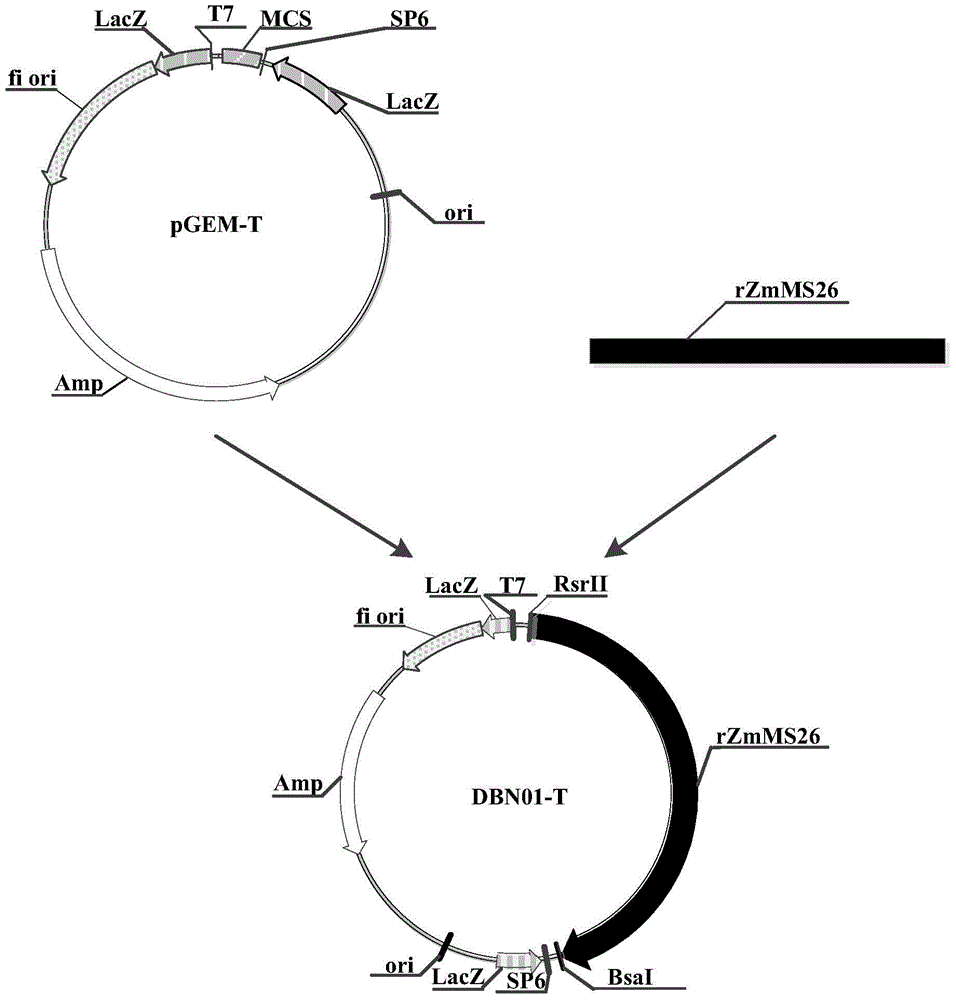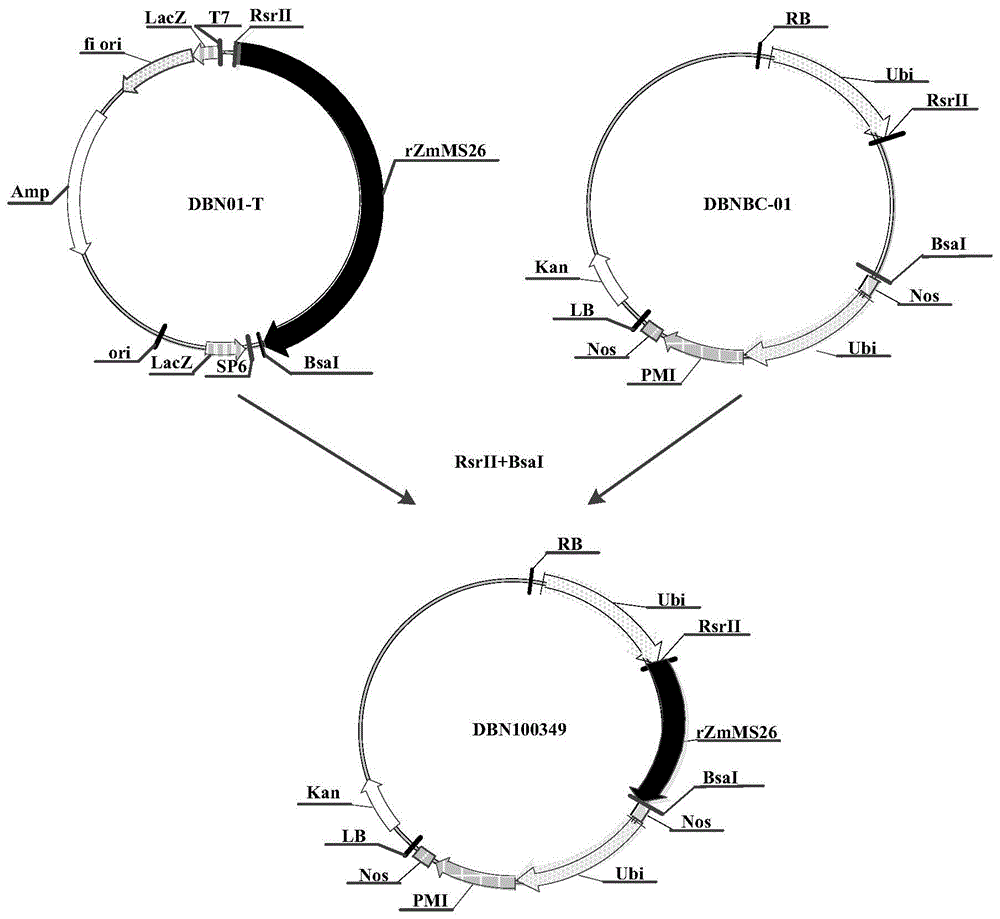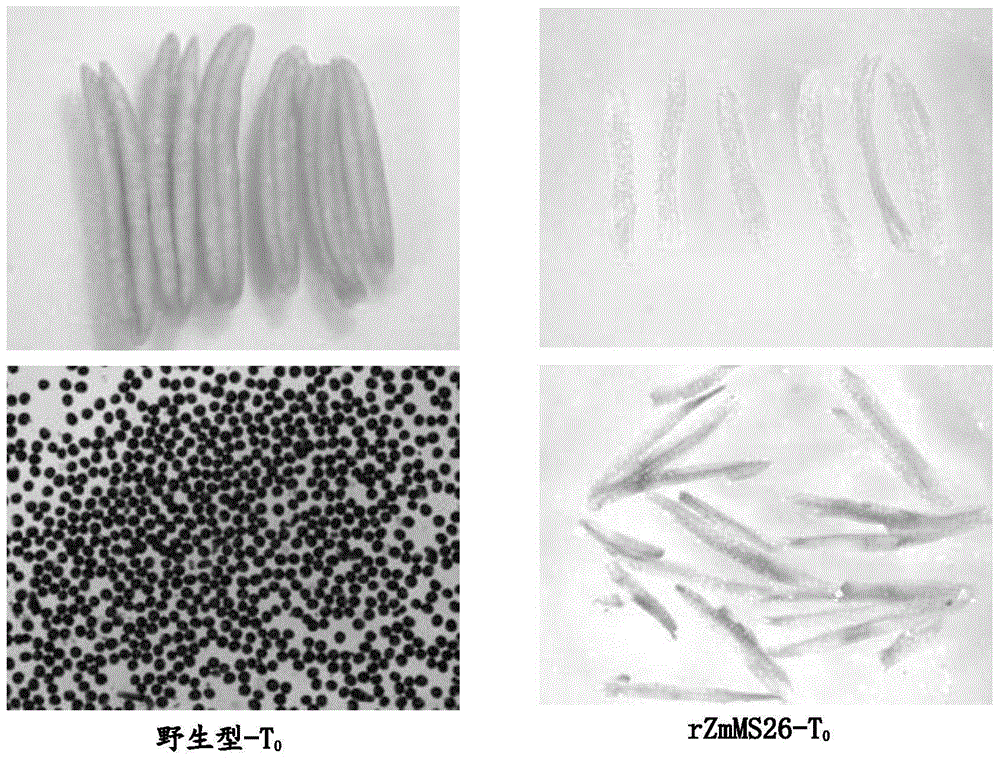Nucleotide sequences mediating male fertility in plants and methods of using same
A nucleotide sequence, male sterility technology, applied in the fields of botanical equipment and methods, plant products, angiosperms/flowering plants, etc., can solve the problem of not finding the MS26 male sterile line
- Summary
- Abstract
- Description
- Claims
- Application Information
AI Technical Summary
Problems solved by technology
Method used
Image
Examples
no. 1 example
[0056] The first embodiment, the synthesis of rZmMS26 nucleotide sequence
[0057] According to the known ZmMS26 nucleotide sequence (as shown in SEQ ID NO: 1 in the sequence listing), the RZmMS26 nucleotide sequence of the present invention is shown in SEQ ID NO: 2 in the sequence listing; the rZmMS26 nucleotide sequence is shown in As shown in SEQ ID NO:3 in the sequence listing, the rZmMS26 nucleotide sequence was synthesized by Nanjing GenScript Biotechnology Co., Ltd.; the 5' end of the synthesized rZmMS26 nucleotide sequence (SEQ ID NO:3) was also A RsrII restriction site is connected, and the 3' end of the rZmMS26 nucleotide sequence (SEQ ID NO: 3) is also connected with a BsaI restriction site.
no. 2 example
[0058] The second embodiment, construction of recombinant expression vector and transformation of recombinant expression vector into Agrobacterium
[0059] 1. Construction of recombinant cloning vector DBN01-T containing rZmMS26 nucleotide sequence
[0060] The synthetic rZmMS26 nucleotide sequence was ligated into the cloning vector pGEM-T (Promega, Madison, USA, CAT: A3600), and the operation steps were carried out according to the instructions of the pGEM-T vector produced by Promega Company to obtain the recombinant cloning vector DBN01-T, which Build process such as figure 1 Shown (wherein, Amp represents the ampicillin resistance gene; f1 represents the replication origin of phage f1; LacZ is the LacZ start codon; SP6 is the promoter of SP6 RNA polymerase; T7 is the promoter of T7 RNA polymerase; rZmMS26 is the nucleoside of rZmMS26 acid sequence (SEQ ID NO: 3); MCS is a multiple cloning site).
[0061] Then, the recombinant cloning vector DBN01-T was transformed into ...
no. 3 example
[0068] The third embodiment, the acquisition and verification of maize plants transferred to the rZmMS26 nucleotide sequence
[0069] 1. Obtaining maize plants transferred to the rZmMS26 nucleotide sequence
[0070] According to the commonly used Agrobacterium infection method, the immature embryos of the aseptically cultured maize variety Zong 31 (Z31) were co-cultured with the Agrobacterium described in 3 in the second example, so that the The T-DNA in the recombinant expression vector DBN100349 (including the rZmMS26 nucleotide sequence, the promoter sequence of the maize Ubiquitin gene, the PMI gene and the Nos terminator sequence) was transferred into the maize genome, and the rZmMS26 nucleotide sequence was obtained maize plants; meanwhile, wild-type maize plants were used as controls.
[0071] For Agrobacterium-mediated transformation of maize, briefly, immature immature embryos are isolated from maize and the immature embryos are contacted with a suspension of Agrobac...
PUM
 Login to View More
Login to View More Abstract
Description
Claims
Application Information
 Login to View More
Login to View More - R&D
- Intellectual Property
- Life Sciences
- Materials
- Tech Scout
- Unparalleled Data Quality
- Higher Quality Content
- 60% Fewer Hallucinations
Browse by: Latest US Patents, China's latest patents, Technical Efficacy Thesaurus, Application Domain, Technology Topic, Popular Technical Reports.
© 2025 PatSnap. All rights reserved.Legal|Privacy policy|Modern Slavery Act Transparency Statement|Sitemap|About US| Contact US: help@patsnap.com



